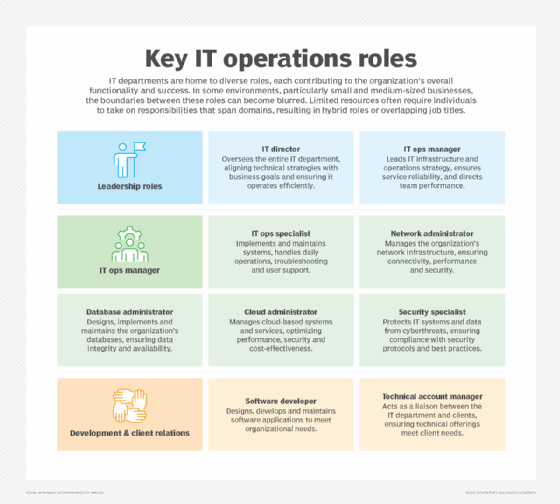
IT operations manager vs. specialist: Compare roles and skills
Discover the critical differences between IT operations specialists and managers and why both roles remain in high demand.
IT operations cover the processes, services and tasks managed by an organization's IT department. These functions are critical for implementing and supporting IT services for both internal and external customers. Within the IT ops team, roles range from specialists to managers, each contributing to the department's overall success.
This article explores the roles of IT operations managers and specialists, highlighting their significance, responsibilities and career impact. Whether you are a career planner, job seeker, organizational leader or hiring team member, understanding these roles is essential for making informed decisions.
IT operations in the ITIL framework
IT ops is a fundamental component of the IT department, so much so that it's one of four functions outlined in the Information Technology Infrastructure Library (ITIL) framework. The ITIL framework categorizes IT functions into the following areas:
- IT operations.
- Technical management.
- Application management.
- Service desk management.
Core responsibilities of IT operations
The responsibilities of IT operations are broad and essential to the smooth functioning of an organization's IT infrastructure. Key tasks include the following:
- Infrastructure management. Overseeing on-premises and cloud-based components.
- Resource allocation. Ensuring efficiency and cost-effectiveness in IT resource usage.
- Service delivery. Managing the delivery of IT services to organizational needs.
- Routine maintenance. Performing backups, updates and configuration management.
- Security monitoring. Configuring and monitoring systems to safeguard against threats.
- Performance monitoring. Ensuring uptime and optimal service performance.
- Incident management. Addressing and resolving IT incidents to minimize disruptions.
The IT ops team: Specialists and generalists
An IT operations team typically includes a mix of specialists and generalists. Specialists focus on specific areas, such as database management or cloud infrastructure. Generalists handle various daily tasks and troubleshooting across diverse systems, often spanning Linux and Windows environments.
An IT operations manager leads the team and ensures it remains focused on business goals.

IT operations manager: Strategic leadership
The IT operations manager oversees the organization's IT infrastructure and operations, ensuring IT services' availability, reliability and efficiency. While the role involves strategic oversight, technical knowledge remains essential for understanding and addressing the challenges of modern IT environments.
Key responsibilities of IT ops managers include the following:
- Service delivery. Managing IT operations to ensure smooth and reliable service delivery.
- Performance metrics. Setting and monitoring key performance indicators.
- Service levels. Maintaining and improving service-level agreements (SLAs).
- Team management. Hiring, training and leading the IT operations team.
- Budgeting and vendor coordination. Managing budgets and collaborating with external vendors.
- Resource allocation. Optimizing the use of IT resources.
- Infrastructure management. Overseeing on-premises, virtual and cloud-based IT resources.
- Security oversight. Ensuring compliance, updates, configuration and monitoring of security measures.
- Incident response. Planning for and managing disaster recovery and incident response.
- Stakeholder communication. Reporting and collaborating with organizational leaders.
While the role might involve stepping back from day-to-day technical tasks, the IT operations manager must understand technologies such as cloud computing, networking and cybersecurity. Additionally, the role includes budgeting, vendor management and aligning IT operations with broader business strategies.
Skill development for IT operations managers
To succeed in this leadership role, IT operations managers should focus on a mix of technical, managerial and strategic skills. Recommended certifications include the following:
Service management
Project management
- Project Management Professional (PMP).
- CompTIA Project+.
Security management
- Certified Information Systems Auditor (CISA).
- Certified Information Systems Security Professional (CISSP).
As noted, although the role leans heavily on strategic oversight, maintaining technical skills in areas such as cloud computing, security and OSes can be invaluable for addressing complex challenges and guiding the team effectively.
IT operations specialist: A hands-on role
An IT operations specialist is a technical, hands-on role focusing on the daily operations of systems and networks. These professionals are integral to ensuring the smooth functioning of IT services and infrastructure.
Key responsibilities of IT operations specialists include the following:
- System operations. Deployment, support and maintenance of IT systems.
- Application and system updates. Patching and updating software to ensure optimal performance.
- Backup and restore. Managing backups and recovery processes.
- Security configurations. Implementing and maintaining security measures.
- Incident response. Troubleshooting and resolving technical issues.
- User support. Providing technical assistance to end users.
- Application management. Installing, testing and maintaining applications.
- Documentation. Maintaining IT documentation and developing standard operating procedures.
- Special projects. Handling additional tasks assigned by the IT operations manager.
The role typically revolves around two primary areas: system support and user support. However, it also includes responsibilities for special projects and initiatives that align with organizational needs.
Skill development for IT operations specialists
The IT operations specialist role emphasizes configuration, problem-solving and technical expertise. To excel in this position, professionals should consider pursuing certifications that align with their responsibilities. Recommended certifications include the following:
System management
- Microsoft Certified: Windows Server Hybrid Administrator Associate.
- Red Hat Certified Engineer (RHCE).
- Red Hat Certified System Administrator (RHCSA).
Security
- CompTIA Security+.
- Certified Ethical Hacker (CEH).
Network management
- Cisco Certified Network Associate (CCNA).
- CompTIA Network+.
Cloud services
- AWS Certified SysOps Administrator-Associate.
- Microsoft Certified: Azure Administrator Associate.
- Google Associate Cloud Engineer.
- CompTIA Cloud+.
These certifications reflect the hands-on, technical nature of the role and help professionals stay current with evolving technologies.
Key differences between IT ops specialists vs. IT ops managers
The roles of IT ops specialists and managers are distinct yet complementary, each playing a critical part in the success of IT operations. The primary difference between these roles is their focus on the following:
- Leadership.
- Strategy.
- Organizational responsibilities.
- Technical expertise.
IT ops managers are responsible for leading the IT operations department. Their role involves providing direction, setting priorities and ensuring the team's efforts align with the organization's broader goals. In contrast, IT ops specialists have fewer leadership responsibilities. While they might occasionally delegate tasks or assist in coordinating specific projects, their primary focus is on executing the department's technical and operational aspects.
Strategically, IT ops managers define the department's long-term direction. They focus on aligning IT operations with business objectives and ensuring their team's efforts contribute to organizational success. IT ops specialists, on the other hand, are tasked with implementing the tactical elements of this strategy. Their work ensures that the IT department's day-to-day operations run smoothly and efficiently.
When it comes to responsibilities, IT ops managers oversee the delegation of tasks and ensure that responsibilities are distributed effectively across the team. Specialists, in turn, receive these delegated tasks.
The technical expectations of these roles also differ. IT ops managers, while primarily focused on strategy, must possess enough technical knowledge to understand the department's requirements, assist with daily operations when necessary and steer the team's overall direction. Specialists, by contrast, are deeply immersed in the technical aspects of IT operations. Their role requires high technical proficiency, particularly in system administration and troubleshooting. Specialists must also remain adaptable, continually acquiring new skills to keep pace with rapidly evolving technologies.
The outlook for IT operations roles
The demand for IT operations roles remains strong in 2025, with positions requiring expertise in network, cloud, security and system administration ranking in the top 15% of in-demand roles, according to Robert Half. Many organizations are increasingly relying on contract employees to fill these specialized positions.
The importance of IT specialists and managers
IT operations are a cornerstone of every business's infrastructure, ensuring critical services' functionality, reliability and availability. The IT ops team maintains operations and aligns IT services with business objectives. Within this team, the IT ops manager provides leadership, strategic direction and oversight, ensuring the department's success. Meanwhile, IT ops specialists focus on the day-to-day implementation of strategies, ensuring that systems and services operate efficiently.
Both roles offer excellent career paths, with stable growth projected for 2025 and beyond.
Damon Garn owns Cogspinner Coaction and provides freelance IT writing and editing services. He has written multiple CompTIA study guides, including the Linux+, Cloud Essentials+ and Server+ guides, and contributes extensively to Informa TechTarget, The New Stack and CompTIA Blogs.








